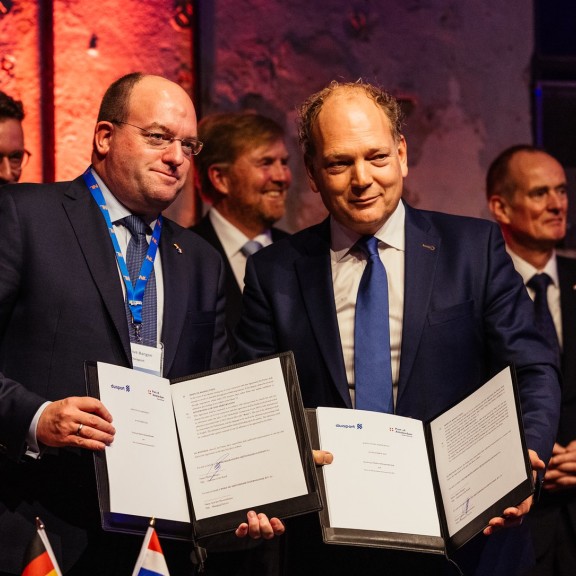
Port of Amsterdam bolsters European hydrogen position with new agreements
Together with a wide variety of partners, Port of Amsterdam announced three agreements during the H2 Connecting Event in Duisburg, which bolster the port’s position as a key supplier of renewable hydrogen and its derivatives to the German market. The aim of the H2 Connecting Event, presided over by His Majesty the King of the Netherlands Willem-Alexander, is to strengthen the collaboration between the Netherlands and Germany in the field of renewable hydrogen, as well as to lay the foundation for intra-European corridors, with Spanish producers potentially supplying German off-takers via the Netherlands. The three agreements signed by Port of Amsterdam pursue these same goals, and seek to leverage the existing partnerships Port of Amsterdam has with prominent prospective producers.
Memorandum of Understanding to explore development of intra-European corridor for renewable hydrogen
The first agreement builds on the connection created earlier this year between Port of Amsterdam and the Basque Country. This Memorandum of Understanding (MoU), together with Port of Bilbao, Petronor, EVE, Zenith Energy Terminals and Evos Amsterdam, has been extended with duisport, in order to explore the development of an intra-European corridor for renewable hydrogen. The MoU follows the ambitions of the European Union to establish such intra-European corridors. The addition of duisport opens up the possibility to supply Basque hydrogen to the large industrial offtakers located in the Rhine-Ruhr region, with the port of Amsterdam serving as a gateway for renewable hydrogen and synthetic fuels to the German market.
The Bilbao region provides a strong base for this collaboration, as Petronor is developing several projects for the production of renewable hydrogen. Andima Ormaetxe Bengoa, Director Operations, Commercial and Logistics of Port of Bilbao, said: “Port of Bilbao is one of the four ports ranked as first level by Spanish Ports National Institution, leading the environmental policies in Spain. Port of Bilbao is also a hub for short sea shipping, facilitating around 30% of trade between Spain and Europe. It is our aim to become carbon neutral by 2050 and therefore green corridors between Bilbao, the Netherlands and Germany are of importance to help decarbonise, not only the Basque Country Industry, but also other industrial regions within Europe.”
Joint Study Agreement between duisport and Port of Amsterdam
The second agreement signed is based on the premise that a key part of this Spanish-Netherlands-German renewable hydrogen corridor, is the connection between the ports of Amsterdam and Duisburg. As part of the existing strategic cooperation between both ports, Port of Amsterdam and duisport signed a Joint Study Agreement, with the specific aim of assessing technical and financial requirements, transport modalities, and infrastructure for the realisation of a resilient supply chain between the two ports.
Duisport is Europe’s largest inland port and aims to become a European hydrogen hub. Markus Bangen, CEO of duisport, said: "By expanding this trusting cooperation, we are sending an important signal for cross-border collaboration: only by working together we can master global challenges such as the energy transition and quickly develop a Europe-wide hydrogen network. The aim is to work at full speed to make the transport chains between the western ports noticeably more resilient and to optimise the infrastructure. In this way, the Port of Duisburg is not only further expanding its function as a central logistics hub for Europe, but is also strengthening industry in the Rhine-Ruhr region and in NRW as a whole."
Green liquid hydrogen connection
The third agreement, signed with EnBW Energie Baden-Württemberg AG, a leading energy company in Germany and provider of renewable energies and infrastructure, Zenith Energy Terminals and GasLog, strives to establish a green, liquid hydrogen connection through the port of Amsterdam to the facilities of EnBW in Germany. This Framework Agreement aspires to leverage the collaborations Port of Amsterdam, Zenith Energy Terminals and GasLog have in place, including with producers in the UAE, Saudi Arabia, Spain and Oman. Mr. Peter Heydecker, Executive Director Trading, stated: “EnBW pursues several pathways for the transport of hydrogen. Thus we want to ensure security of renewable energy supply and further use limitation of fossil-based energy sources, thereby actively contributing to the decarbonisation of our economy.”
Port of Amsterdam as transhipment hub for renewable energy
These three agreements underline the ambition of Port of Amsterdam to become not only a key destination of imported renewable hydrogen and its derivatives, but also to serve as a transhipment hub to supply renewable energy to the German hinterland. Dorine Bosman, Chief Investment Officer at Port of Amsterdam, stated: “As a partner, Port of Amsterdam is committed to contribute to the decarbonisation of industries within Europe. We believe that the development of intra-European hydrogen corridors is essential. The port of Amsterdam has a key role to play as a conduit for hydrogen and e-fuels to the Rhine-Ruhr area. This supply is of vital strategic importance on a European level, which is why our shared focus with duisport on the resilience of the supply chain is crucial. This way, we can bring a corridor for hydrogen and e-fuels between strong production regions like the Basque Country, the UAE, Saudi Arabia and Oman, and the port of Duisburg to life.”
All three agreements were signed during the H2 Connecting Event in Duisburg in the presence of His Majesty the King of the Netherlands Willem-Alexander, Director-General for Economic Stabilization and Energy Security at the German Federal Ministry for Economic Affairs and Climate Action, Dr. Philipp Steinberg, State Secretary for the Extractive Industries at the Dutch Ministry of Economic Affairs and Climate Change, Hans Vijlbrief, Prime Minister of the German state of North Rhine-Westphalia, Hendrik Wüst and Deputy Premier and Minister for Economic Affairs, Industry, Climate Action and Energy of the State of North Rhine-Westphalia, Mona Neubaur as official witnesses.